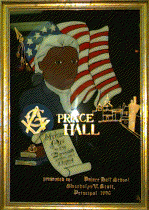 |
Prince Hall Masonry |
 |
 There are
approximately 250,000 black Americans who maintain separate lodges, called Prince
Hall Masonry after its founder.
There are
approximately 250,000 black Americans who maintain separate lodges, called Prince
Hall Masonry after its founder.Prince Hall was a free black man living in Boston during the late 1700's. He and 14 of his friends were made Masons by a travelling military lodge of a British Army regiment. When the Revolutionary War began, the British regiment left Boston, leaving behind Prince Hall and his black brothers. Local American lodges had no desire to take in the black Masons, so Prince Hall made an application to the Grand Lodge of England for a charter to form a new lodge. After some delay, a charter was issued on September 29, 1784, authorizing the formation of African Lodge No.459. African Lodge was not welcomed by American lodges, and eventually fell out of communication with the English Grand Lodge. It finally declared itself an independant Grand Lodge (American lodges did the same during the Revolutionary War) and began issuing warrants for additional lodges for African- Americans, including warrants for military lodges, which existed in black units in the Civil War. Although there was some free visitation white lodges and Prince Hall lodges, the predominant white lodges condemned Prince Hall Masons as being "clandestine," or unauthorized. the opinions and attitudes of Bay View Lodge No. 120, the Grand Lodge of Connecticut, or its members. It is a shame that an organization devoted to promoting the universal brotherhood of Man would deny a man because of his skin color, and declare a lodge of such men as being clandestine, not "real" masons at all, even though the Prince Hall lodges and Grand Lodges were formed in the same manner as white lodges. That is, African Lodge first received its charter from the Grand Lodge of England, and later formed its own Grand Lodge, which is exactly what the white lodges had done during the Revolutionary War. More sadly, even shocking to some, is the fact that in this day and age Prince Hall Masons still are not recognized by all Grand Lodges in the United States. Prince Hall Masons do not wish to join or merge with state Grand Lodges, understandably wishing to preserve their own identity. Rather, they seek recognition, which would remove the "clandestine" status and allow full visitation between Prince Hall and other lodges, and allow Masons of both organizations to grasp hands in the strong grip of brotherhood. At this time, Grand Lodges in 34 of the 50 United States, plus the District of Columbia, have voted favorably toward full recognition of Prince Hall Grand Lodges. Of these 34, 27 have voted for full recognition, four voted for visitation (as opposed to allowing visitation and dual-membership), one voted for recognition without visitation, and two were unclear or mixed. In the words of Charles H. Tupper MPS, " a few more are on the verge. Some are waiting to see which way the wind blows and some have decided that Hell will freeze first. Some Prince Hall Grand Masters feel this way also." In addition, the grand Lodges of 8 European countries, the Phillipines and Japan, Australia and New Zealand, have all granted recognition for Prince Hall Masons. Oddly enough, 16 of the 17 states that have not granted recognition are those in which slavery was fully lawful prior to the start of the Civil War... It should be noted that the Grand Lodge of Connecticut was the first to approve full recognition, in October, 1989. The following was written by MW William H. Upton PGM of Washington in 1899 - over 100 years ago. " May it not be that our brethren of the South know better than we what is best for the interests of Masonry in the South, as the South now is? May it not be that we, here on the the shores of the prophetic Pacific, know better than they what is best for us? In any event, it is the immemorial law of Masonry that we should regulate our affairs; they, theirs. And have we forgotten that it is also the law that we should "judge with candor, admonish with friendship, and reprehend with justice," and that, if "submission is impracticable," we must carry on our contention "without Wrath and Rancor," and "saying or doing nothing which may hinder Brotherly Love and good Offices to be renewed and continued, that we all may see the Benign Influence of Masonry, as all true Masons have done from the beginning of the World, and will do to the end of time. Amen So Mote It Be"  If anyone has this image with better resolution, please send it to the webmaster at bayvu120web@aol.com |